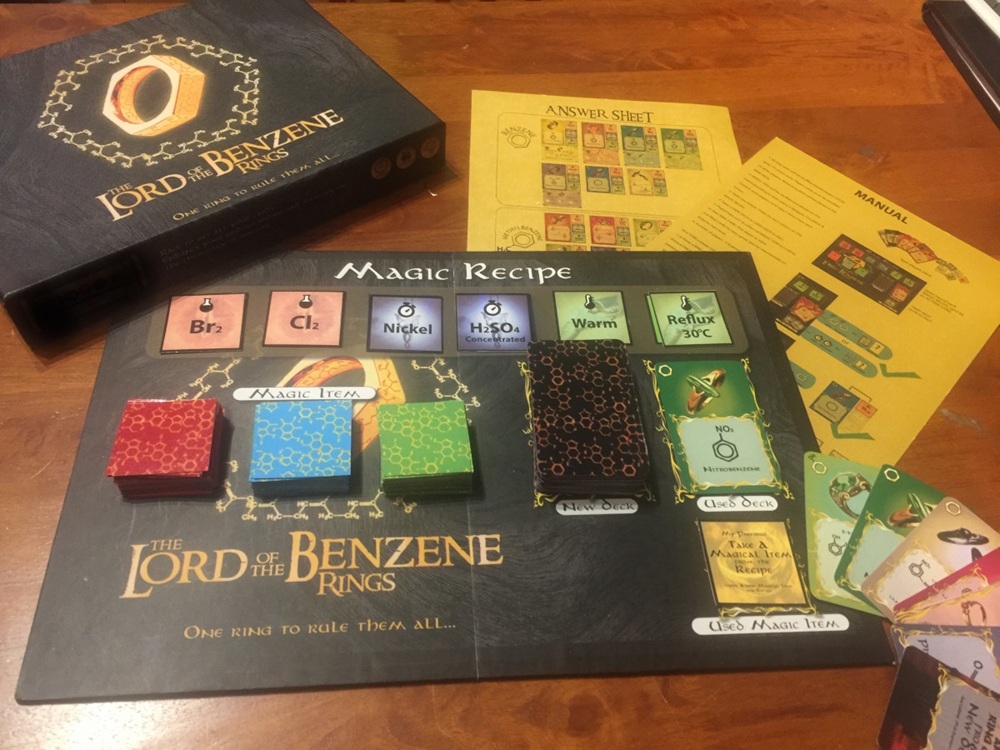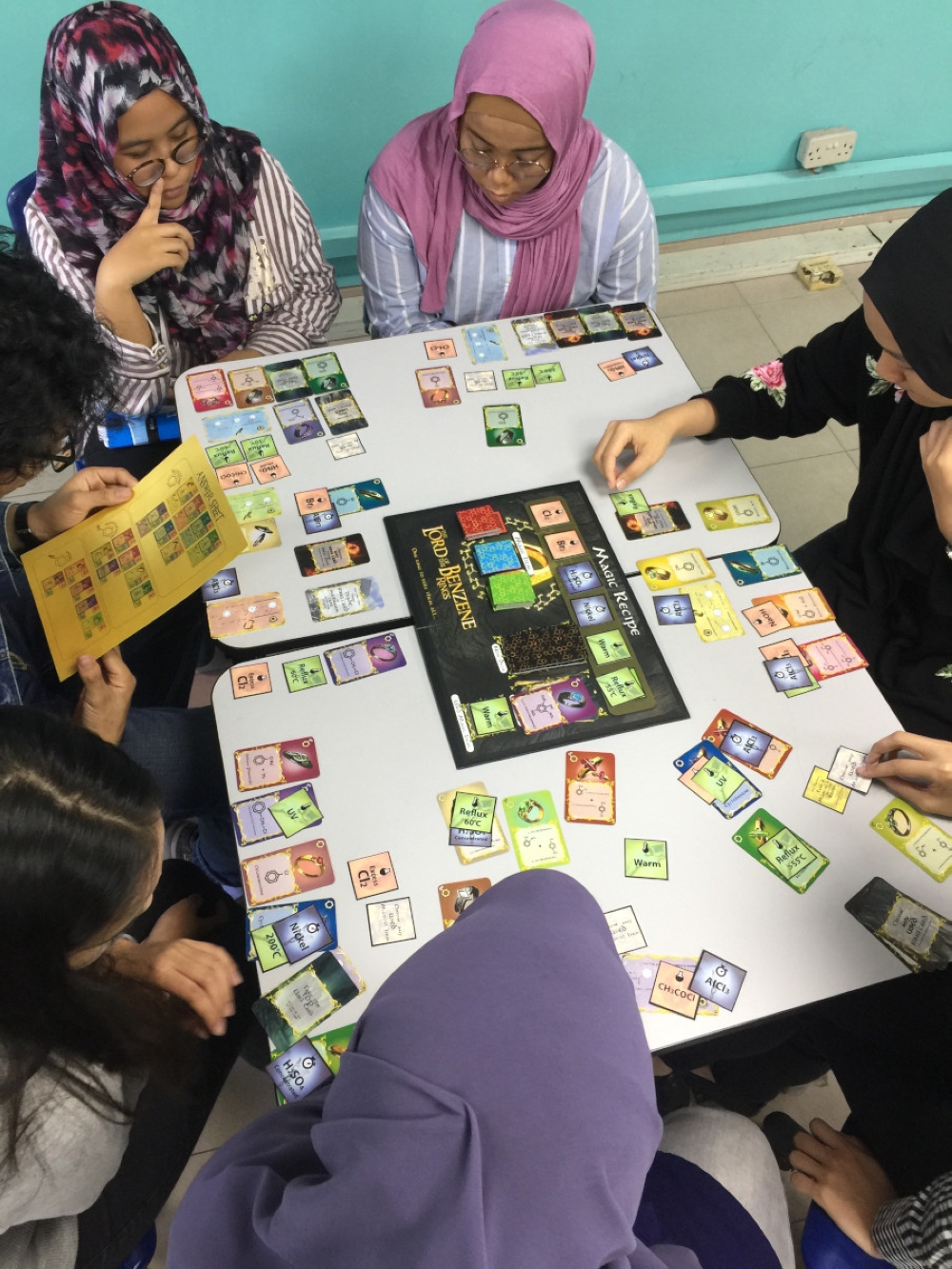JULY 13 — Let’s be honest, organic chemistry isn’t most students’ favourite topic.
Between memorising reagents, conditions, and complicated mechanisms, it can feel like learning a whole new language.
I’ve seen it firsthand as a chemistry teacher: eyes glazing over, students quietly panicking before quizzes, and a general vibe of “this is just too hard.”
So I thought to myself, what if I made it a game? Not just any game, a proper board game.
Something they could touch, see, compete in, and most importantly, enjoy. That’s how my creation, The Lord of the Benzene Rings, came to life.

The board game. — Picture courtesy of Norhafiza Roslan
I introduced the game after I had finished teaching the topic the traditional way — slides, lectures, and discussions.
Then, I gave them a quiz to see where they stood. As expected, many struggled. Reagents were forgotten. Mechanisms got jumbled. It wasn’t surprising, but it was still disheartening.
That’s when I brought out the board game and everything changed. Suddenly, the classroom came alive.
Students were huddled in teams, debating reaction pathways, strategising moves, and laughing over silly mistakes.
They were correcting each other, challenging ideas, and, without realising it, revising the topic. It didn’t feel like a revision class anymore — it felt like fun.
After the game session, I gave them another quiz with the same format, same difficulty. This time, the results were noticeably better.
But what stood out even more than the marks was how they felt. Several students told me, “Miss, now I finally get it,” or “Organic chem isn’t that bad after all.” One even said it was the first time they actually liked the subject.
That was the moment I realised something powerful — the game didn’t just help them remember better, it helped them feel confident.
And in STEM subjects, especially ones as intimidating as chemistry, confidence is half the battle.
We talk so much about digital learning tools, apps, and AI, and yes, they have their place. But this experience reminded me that sometimes, a good old-fashioned board game can do wonders.
No Wi-Fi needed. Just cards, some creativity, and a classroom full of curious minds.
There’s something about being hands-on. When students are physically moving pieces, making decisions, and working with their peers, they’re engaging multiple parts of the brain.
They’re learning in a way that’s active, social, and surprisingly effective.
And it’s not just about academic improvement. It’s also about social and emotional learning.
I saw students who were usually quiet and unsure stepping up, leading their teams, and contributing ideas.
The fear of making mistakes disappeared. Instead, there was laughter, friendly competition, and a shared sense of accomplishment when they solved problems together.
The whole experience got me thinking — why stop at organic chemistry? Since then, I’ve started working on more game ideas: one for acid–base reactions, another for thermodynamics, and even something for kinetics.
I’ve also had great conversations with fellow teachers who are curious about adapting this approach for physics, biology, and even maths.

Students playing the board game. — Picture courtesy of Norhafiza Roslan
The truth is, the potential of board games in education is massive. They’re affordable, reusable, and easy to adapt. Unlike some digital platforms that require subscriptions or constant updates, physical board games can be played semester after semester, across different classrooms.
They’re great for revision workshops, study camps, or even student-led review sessions.
And here’s another thought: why not involve the students in designing these games? Imagine the learning that happens when students themselves create the cards, set the rules, and build the board.
They’d be revising the content, problem-solving, being creative, and collaborating — all key components of a STEM mindset. That’s something I’m hoping to try out soon.
For me, this board game project was a reminder of why I love teaching. It’s not just about covering the syllabus. It’s about connecting with students, sparking curiosity, and making learning meaningful.
The game turned a tough topic into something my students actually looked forward to. And that, to me, is a big win.
So to my fellow educators — if you’re looking for a fresh way to energise your classroom, maybe it’s time to bring in some game pieces.
You don’t need fancy tech. Just an idea, a bit of cardboard, and the willingness to try something new.
Because sometimes, the best learning happens when students forget they’re in a classroom… and just start playing.
* Norhafiza Roslan is a Pegawai Perkhidmatan Pendidikan at Pusat Asasi Sains Universiti Malaya (PASUM). She may be contacted at [email protected].
** This is the personal opinion of the writer or publication and does not necessarily represent the views of Malay Mail.






